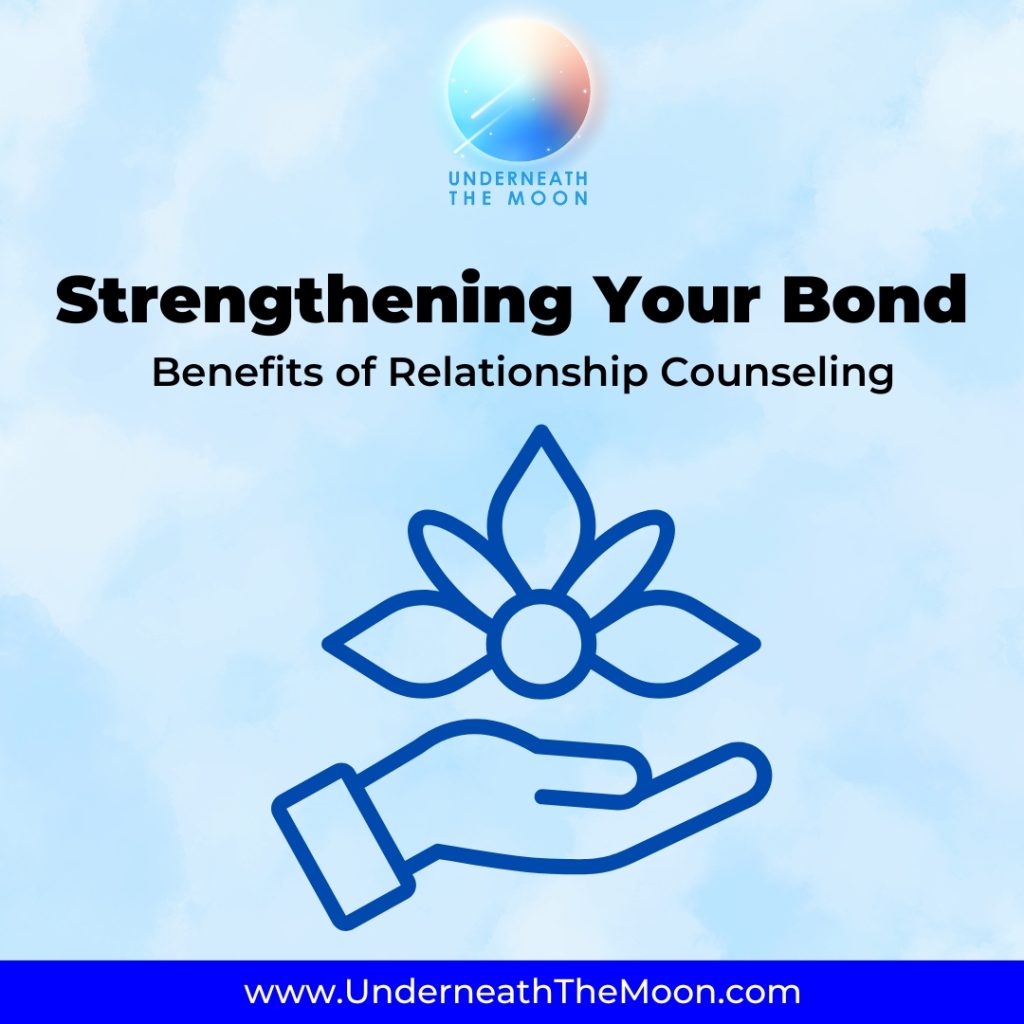
Strengthening Your Bond
Benefits of Relationship Counseling
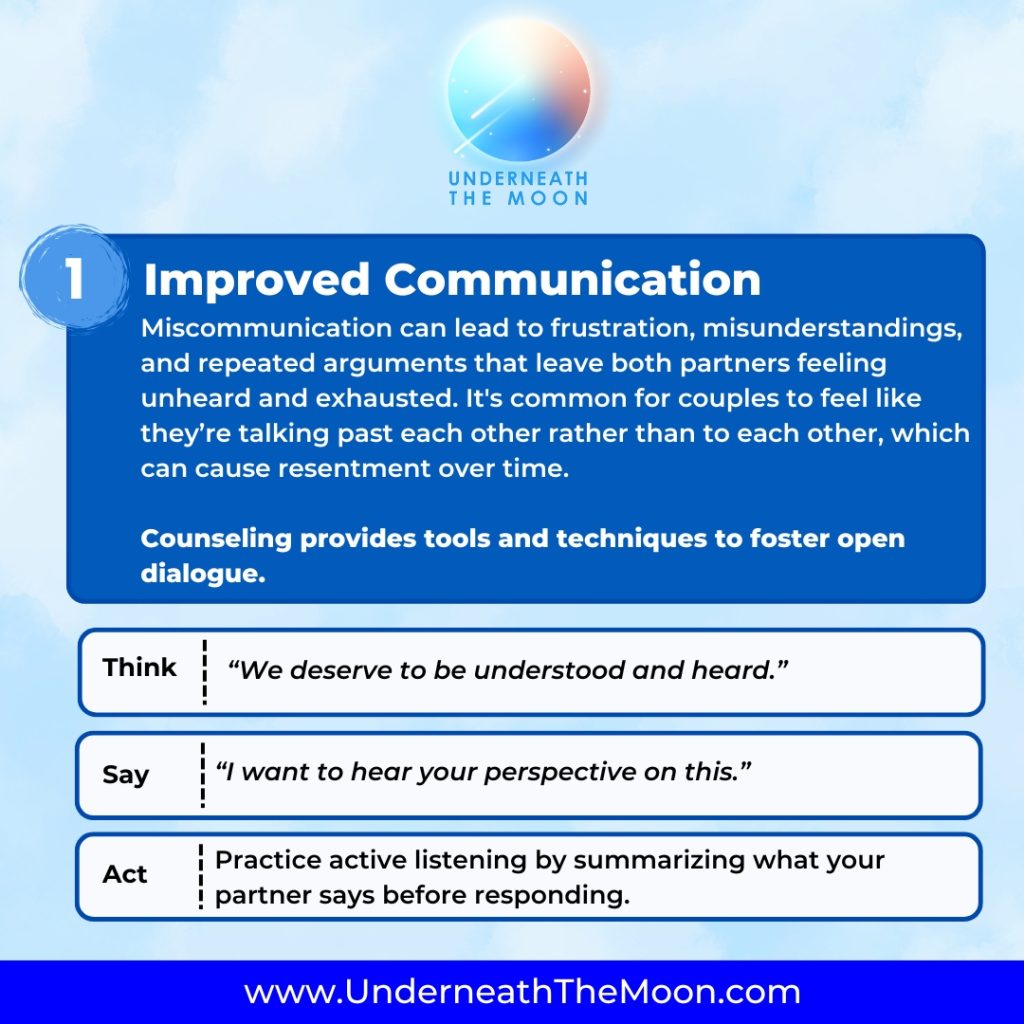
1. Improved Communication
Miscommunication can lead to frustration, misunderstandings, and repeated arguments that leave both partners feeling unheard and exhausted. It’s common for couples to feel like they’re talking past each other rather than to each other, which can cause resentment over time.
Counseling provides tools and techniques to foster open dialogue.
Think: “We deserve to be understood and heard.”
Say: “I want to hear your perspective on this.”
Act: Practice active listening by summarizing what your partner says before responding.
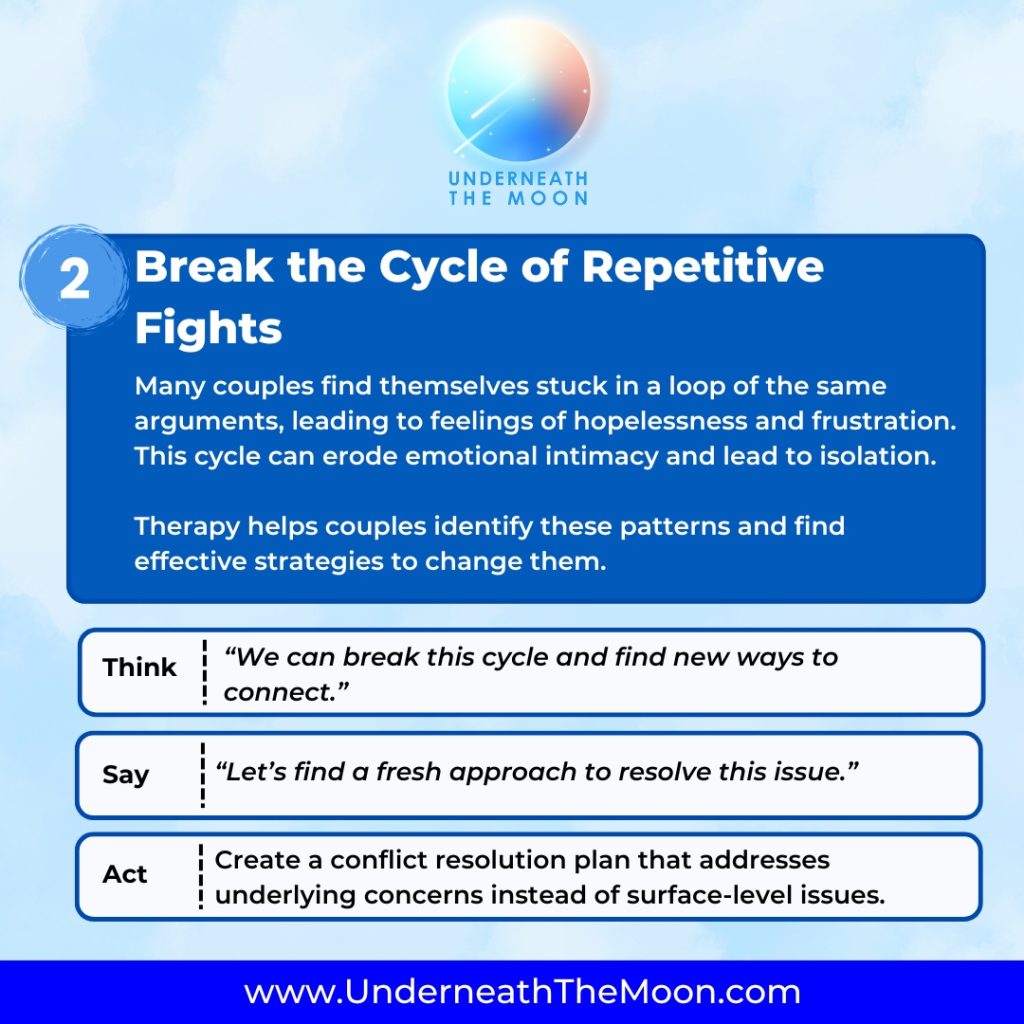
2. Break the Cycle of Repetitive Fights
Many couples find themselves stuck in a loop of the same arguments, leading to feelings of hopelessness and frustration. This cycle can erode emotional intimacy and lead to isolation.
Therapy helps couples identify these patterns and find effective strategies to change them.
Think: “We can break this cycle and find new ways to connect.”
Say: “Let’s find a fresh approach to resolve this issue.”
Act: Create a conflict resolution plan that addresses underlying concerns instead of surface-level issues.
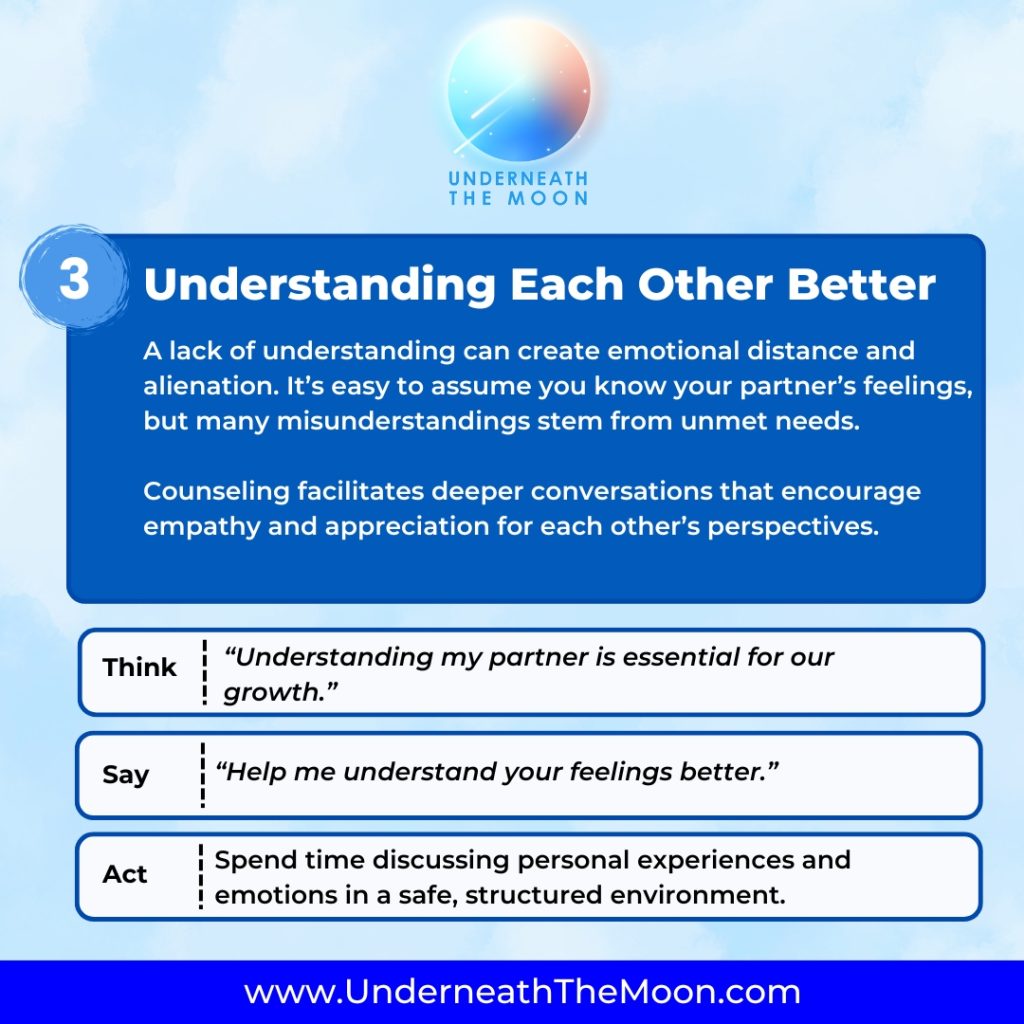
3. Understanding Each Other Better
A lack of understanding can create emotional distance and alienation. It’s easy to assume you know your partner’s feelings, but many misunderstandings stem from unmet needs.
Counseling facilitates deeper conversations that encourage empathy and appreciation for each other’s perspectives.
Think: “Understanding my partner is essential for our growth.”
Say: “Help me understand your feelings better.”
Act: Spend time discussing personal experiences and emotions in a safe, structured environment.
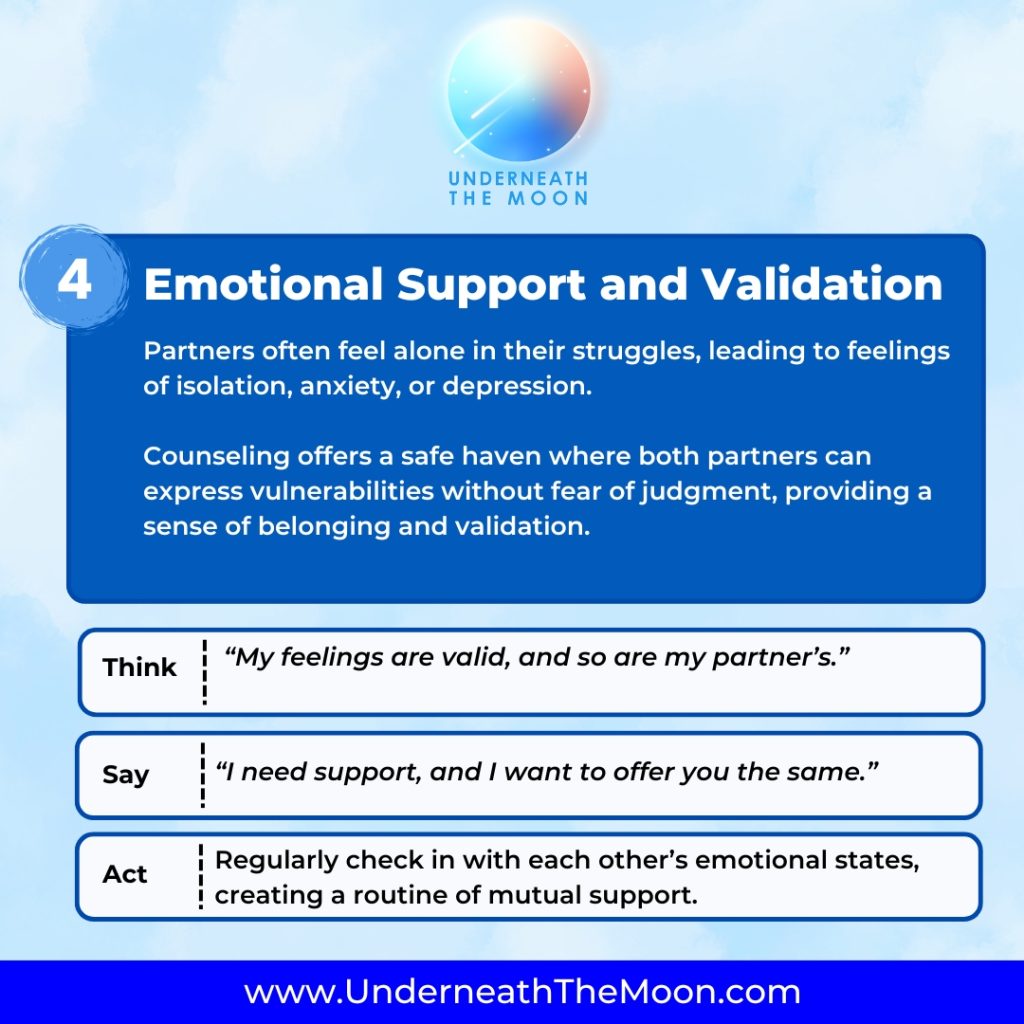
4. Emotional Support and Validation
Partners often feel alone in their struggles, leading to feelings of isolation, anxiety, or depression.
Counseling offers a safe haven where both partners can express vulnerabilities without fear of judgment, providing a sense of belonging and validation.
Think: “My feelings are valid, and so are my partner’s.”
Say: “I need support, and I want to offer you the same.”
Act: Regularly check in with each other’s emotional states, creating a routine of mutual support.
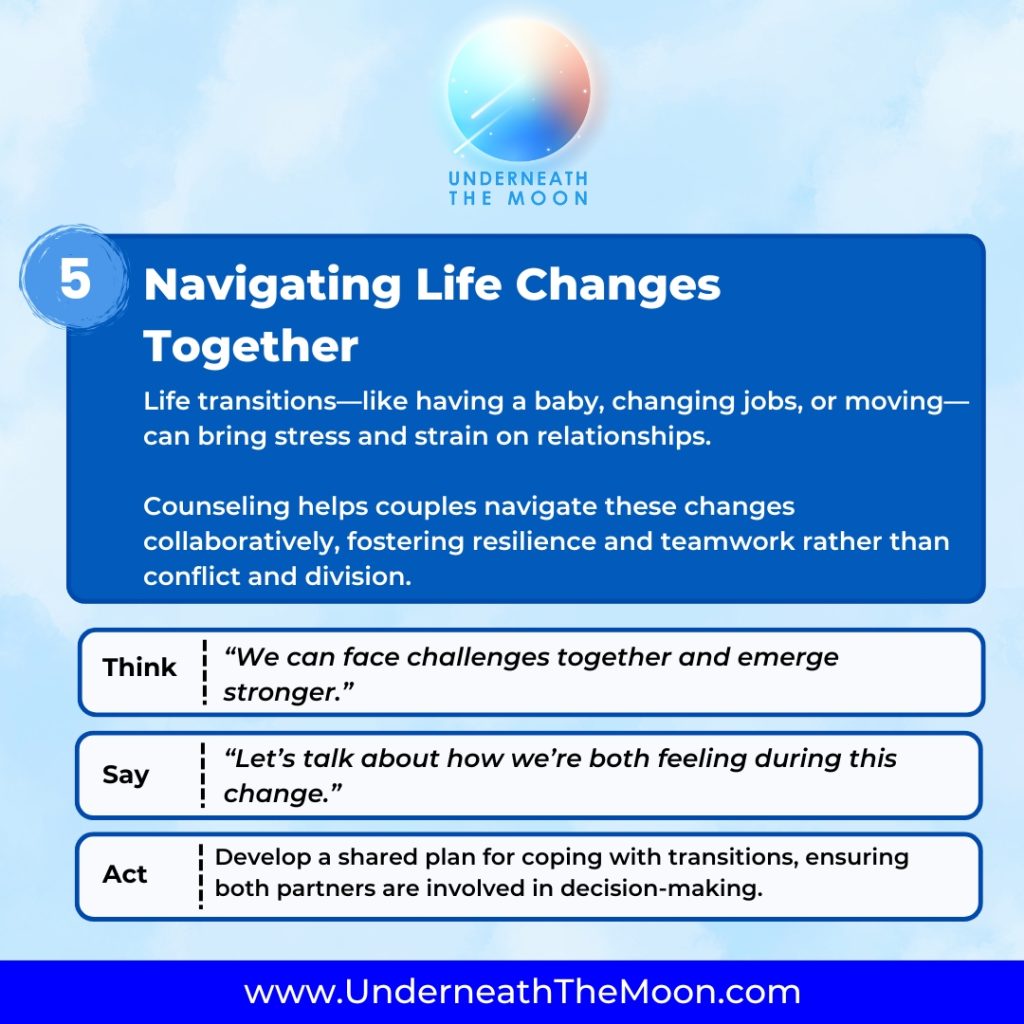
5. Navigating Life Changes Together
Life transitions—like having a baby, changing jobs, or moving—can bring stress and strain on relationships.
Counseling helps couples navigate these changes collaboratively, fostering resilience and teamwork rather than conflict and division.
Think: “We can face challenges together and emerge stronger.”
Say: “Let’s talk about how we’re both feeling during this change.”
Act: Develop a shared plan for coping with transitions, ensuring both partners are involved in decision-making.
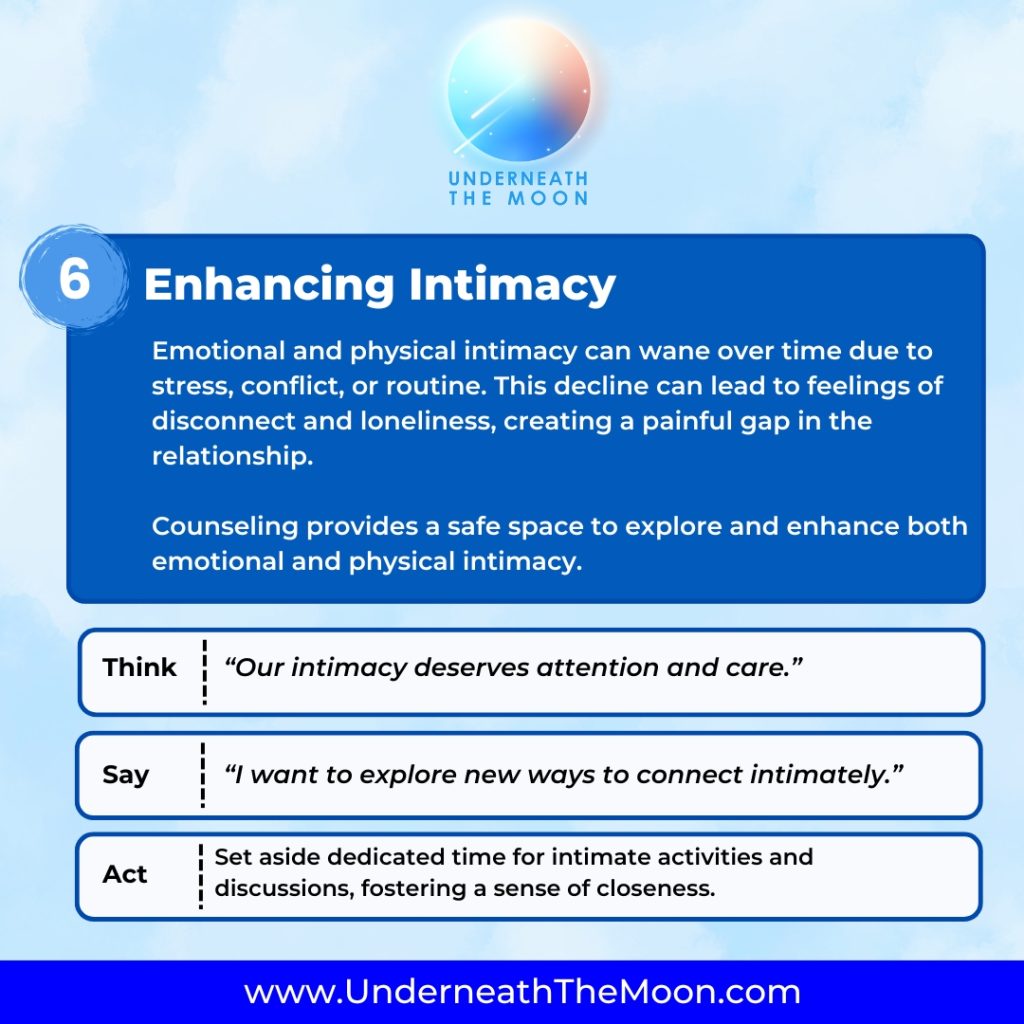
6. Enhancing Intimacy
Emotional and physical intimacy can wane over time due to stress, conflict, or routine. This decline can lead to feelings of disconnect and loneliness, creating a painful gap in the relationship.
Counseling provides a safe space to explore and enhance both emotional and physical intimacy.
Think: “Our intimacy deserves attention and care.”
Say: “I want to explore new ways to connect intimately.”
Act: Set aside dedicated time for intimate activities and discussions, fostering a sense of closeness.
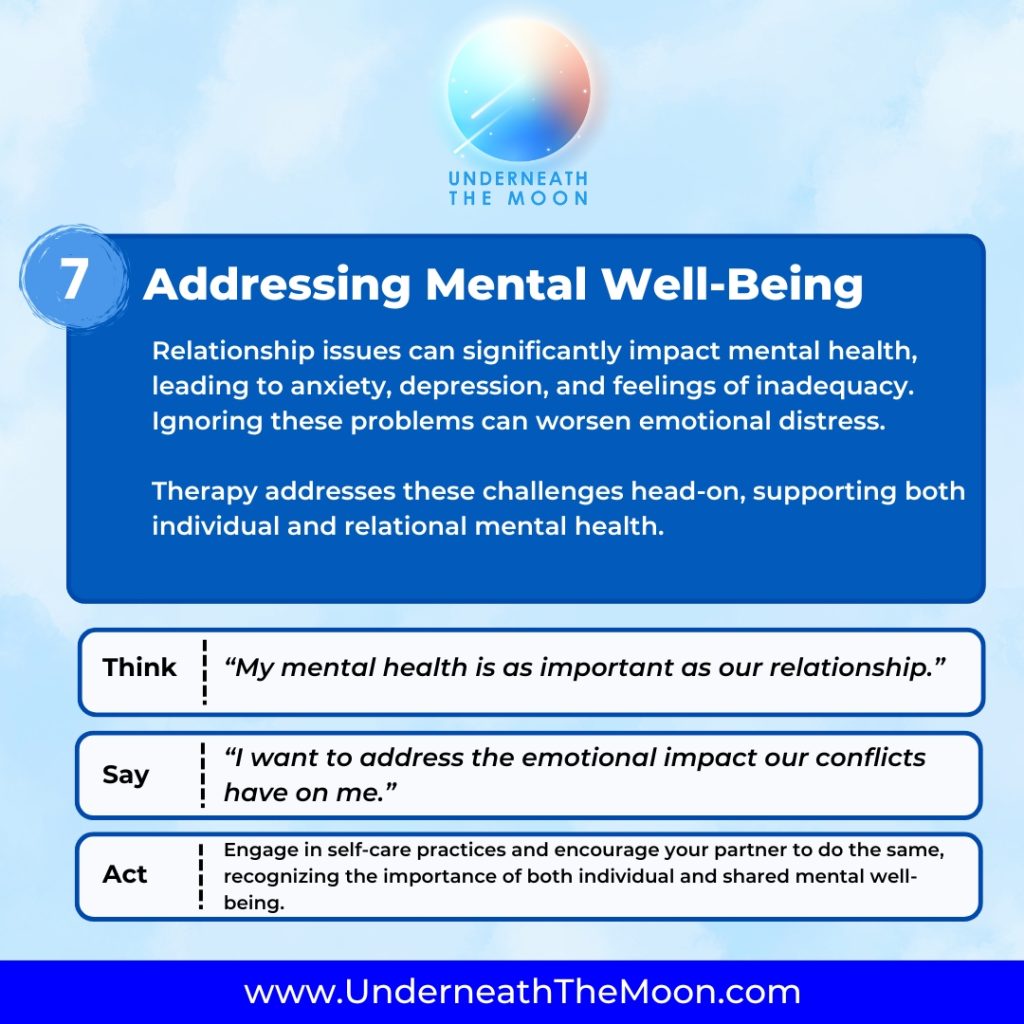
7. Addressing Mental Well-Being
Relationship issues can significantly impact mental health, leading to anxiety, depression, and feelings of inadequacy. Ignoring these problems can worsen emotional distress.
Therapy addresses these challenges head-on, supporting both individual and relational mental health.
Think: “My mental health is as important as our relationship.”
Say: “I want to address the emotional impact our conflicts have on me.”
Act: Engage in self-care practices and encourage your partner to do the same, recognizing the importance of both individual and shared mental well-being.
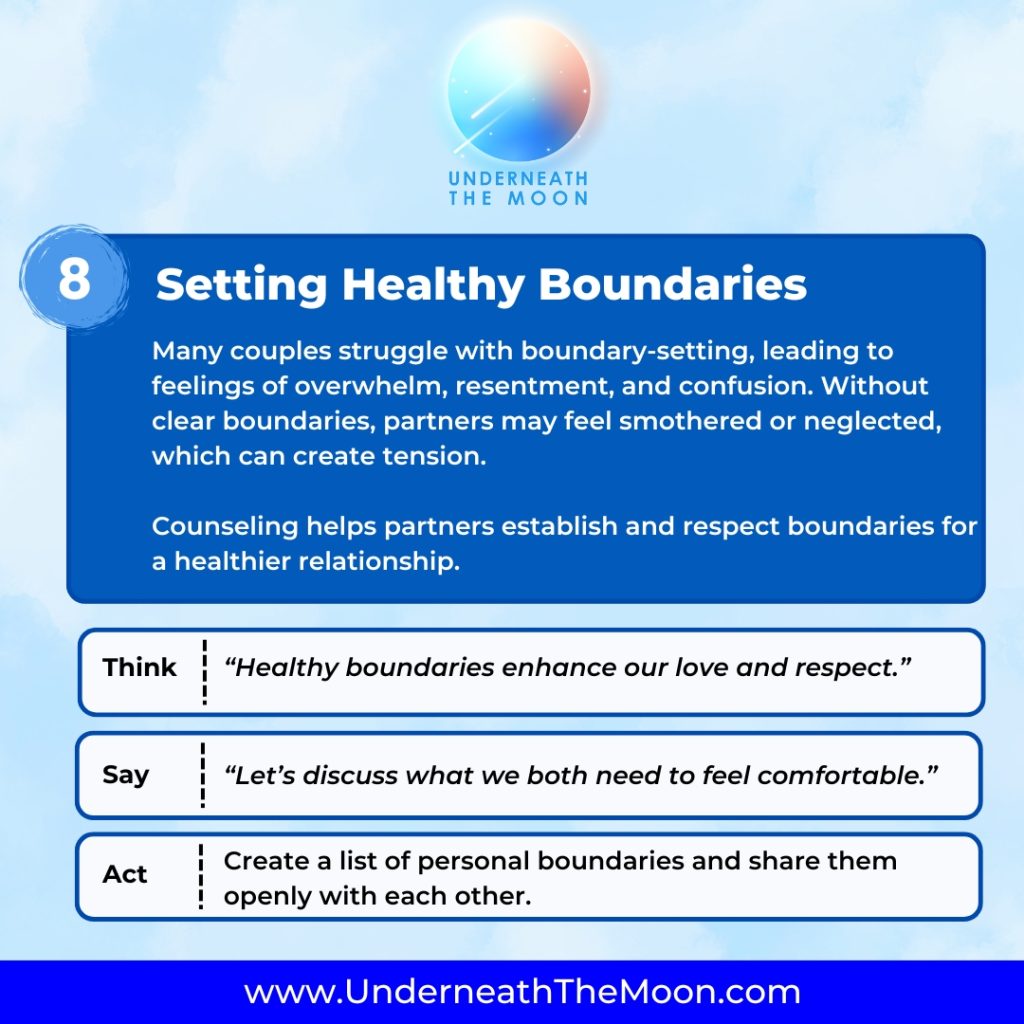
8. Setting Healthy Boundaries
Many couples struggle with boundary-setting, leading to feelings of overwhelm, resentment, and confusion. Without clear boundaries, partners may feel smothered or neglected, which can create tension.
Counseling helps partners establish and respect boundaries for a healthier relationship.
Think: “Healthy boundaries enhance our love and respect.”
Say: “Let’s discuss what we both need to feel comfortable.”
Act: Create a list of personal boundaries and share them openly with each other.
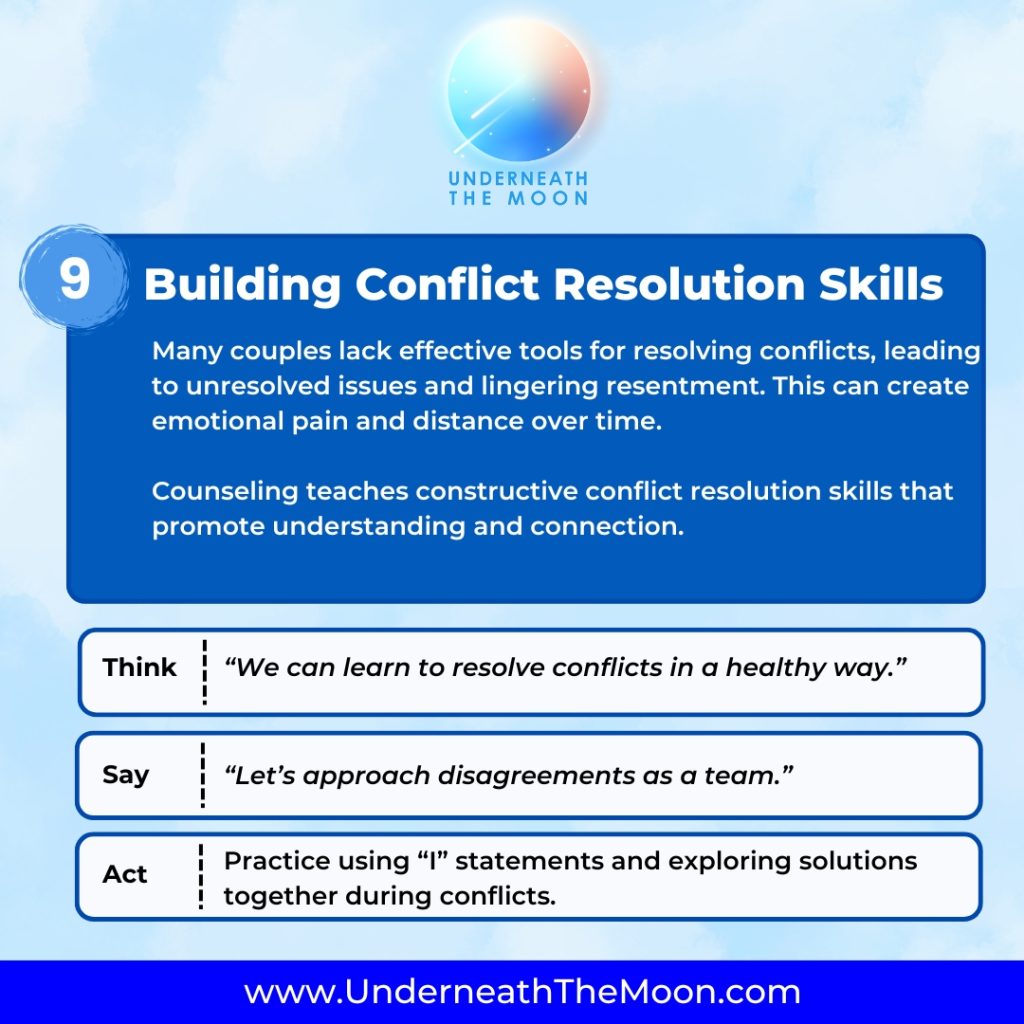
9. Building Conflict Resolution Skills
Many couples lack effective tools for resolving conflicts, leading to unresolved issues and lingering resentment. This can create emotional pain and distance over time.
Counseling teaches constructive conflict resolution skills that promote understanding and connection.
Think: “We can learn to resolve conflicts in a healthy way.”
Say: “Let’s approach disagreements as a team.”
Act: Practice using “I” statements and exploring solutions together during conflicts
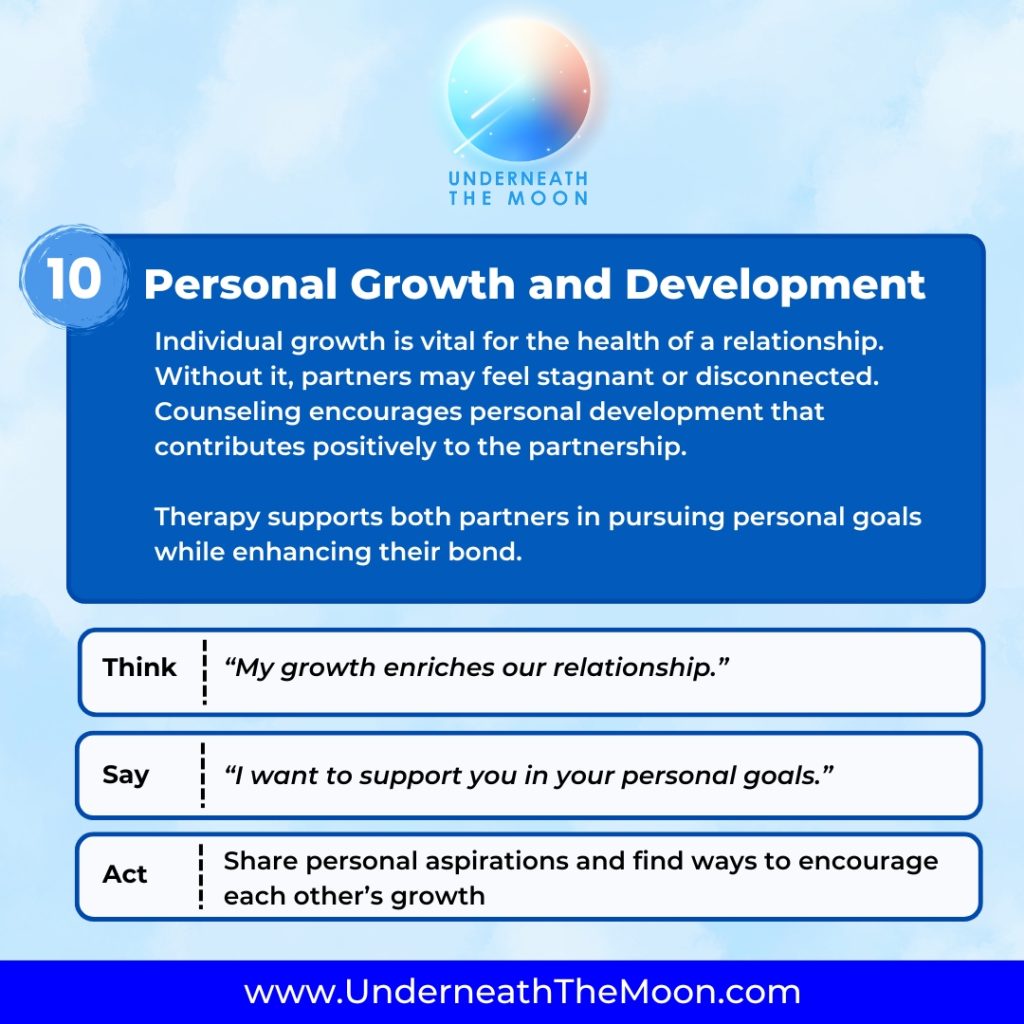
10. Personal Growth and Development
Individual growth is vital for the health of a relationship. Without it, partners may feel stagnant or disconnected. Counseling encourages personal development that contributes positively to the partnership.
Therapy supports both partners in pursuing personal goals while enhancing their bond.
Think: “My growth enriches our relationship.”
Say: “I want to support you in your personal goals.”
Act: Share personal aspirations and find ways to encourage each other’s growth
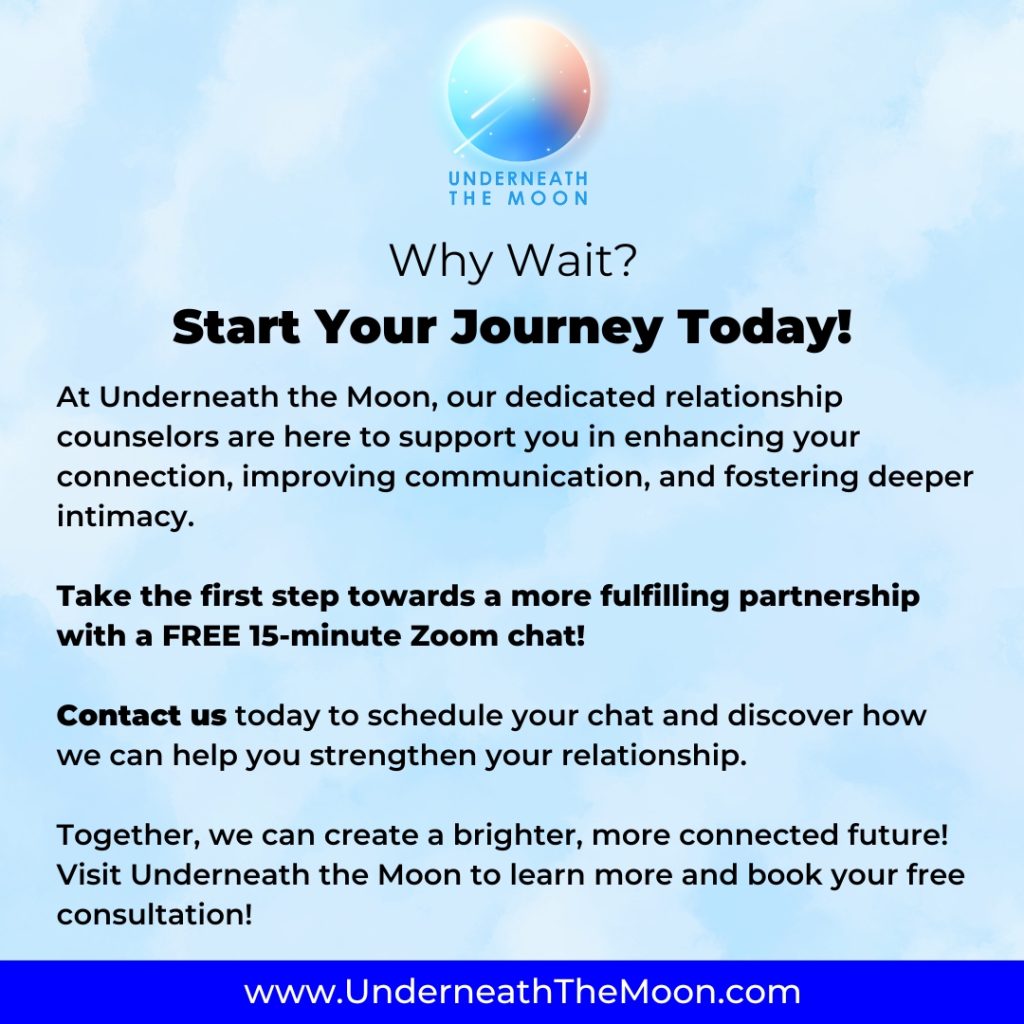
Why Wait?
Start Your Journey Today!
At Underneath the Moon, our dedicated relationship counselors are here to support you in enhancing your connection, improving communication, and fostering deeper intimacy.
Take the first step towards a more fulfilling partnership with a FREE 15-minute Zoom chat!
Contact us today to schedule your chat and discover how we can help you strengthen your relationship.
Together, we can create a brighter, more connected future!
Visit Underneath the Moon to learn more and book your free consultation!
